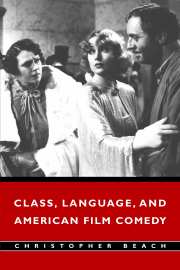Book contents
- Frontmatter
- Contents
- Acknowledgments
- Introduction
- 1 A Troubled Paradise: Utopia and Transgression in Comedies of the Early 1930s
- 2 Working Ladies and Forgotten Men: Class Divisions in Romantic Comedy, 1934–1937
- 3 “The Split-Pea Soup and the Succotash”: Frank Capra's 1930s Comedies and the Subject of Class
- 4 Is Class Necessary?: Preston Sturges and Howard Hawks in the Early 1940s
- 5 Desperately Seeking Status: Class, Gender, and Social Anxiety in Postwar Hollywood Comedy
- 6 Is There a Class in This Text?: Woody Allen and Postmodern Comedy
- 7 Yuppies and Other Strangers: Class Satire and Cultural Clash in Contemporary Film Comedy
- Notes
- Works Cited
- Index
3 - “The Split-Pea Soup and the Succotash”: Frank Capra's 1930s Comedies and the Subject of Class
Published online by Cambridge University Press: 02 December 2009
- Frontmatter
- Contents
- Acknowledgments
- Introduction
- 1 A Troubled Paradise: Utopia and Transgression in Comedies of the Early 1930s
- 2 Working Ladies and Forgotten Men: Class Divisions in Romantic Comedy, 1934–1937
- 3 “The Split-Pea Soup and the Succotash”: Frank Capra's 1930s Comedies and the Subject of Class
- 4 Is Class Necessary?: Preston Sturges and Howard Hawks in the Early 1940s
- 5 Desperately Seeking Status: Class, Gender, and Social Anxiety in Postwar Hollywood Comedy
- 6 Is There a Class in This Text?: Woody Allen and Postmodern Comedy
- 7 Yuppies and Other Strangers: Class Satire and Cultural Clash in Contemporary Film Comedy
- Notes
- Works Cited
- Index
Summary
Among the Hollywood directors who made comedies in the Depression era, Frank Capra was the most consistently concerned with themes of class and social distinction. As Leland Poague has suggested, the unifying thread of Capra's films is an examination of “moral questions having to do with class, economic status [and] life style as defined by class and economic status.” Like the Marx Brothers, Capra emerged from a working-class immigrant background that informed his views of class relations and made him highly critical of the upper-class WASP establishment. At the same time, as an auteurist director within the Hollywood studio system, Capra repeatedly presented the story of a social outsider who is forced to work within the structure of a restrictive, manipulative, or corrupt social order. In Capra's films of the 1930s, we see the juxtaposition of two dominant narratives of class in America. On the one hand, Capra's comedies enact a celebration of the American success ethic (or “American Dream”) in which Capra had himself participated. On the other hand, the films reflect an acute awareness of the reality of the class conflict to which Depression-era Americans were subject.
In many of Capra's films, the upwardly mobile trajectory of the success story is brought into tension with some form of class conflict; the ultimate resolution of this tension determines whether the film offers an ultimately utopian social vision or a more subversive view of American society.
- Type
- Chapter
- Information
- Class, Language, and American Film Comedy , pp. 67 - 94Publisher: Cambridge University PressPrint publication year: 2002



